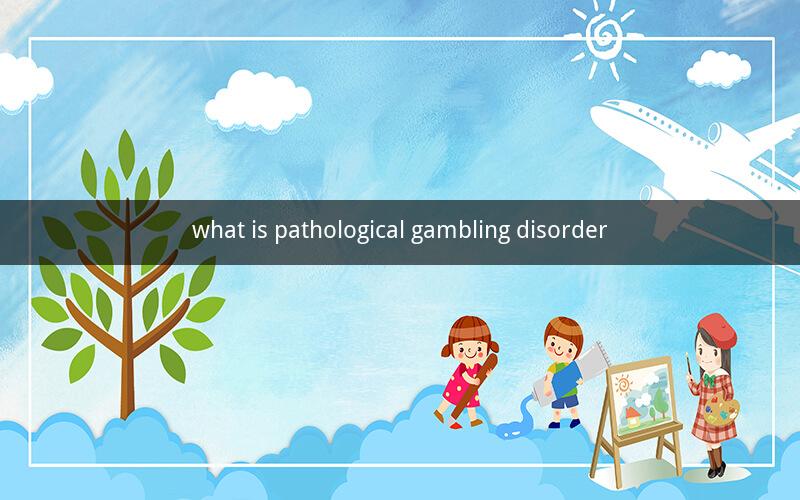
Table of Contents
1. Introduction to Pathological Gambling Disorder
2. Definition and Symptoms
3. Causes and Risk Factors
4. Diagnosis and Treatment
5. Impact on Individuals and Society
6. Prevention and Support
7. Case Studies
8. Conclusion
1. Introduction to Pathological Gambling Disorder
Pathological gambling disorder, often referred to as gambling addiction, is a mental health condition characterized by an uncontrollable urge to gamble, despite the negative consequences it may cause. This disorder affects individuals of all ages, genders, and socioeconomic backgrounds, and can lead to significant personal, financial, and emotional problems.
2. Definition and Symptoms
Pathological gambling disorder is defined by the American Psychiatric Association (APA) as a behavioral addiction that involves repeated and compulsive gambling. Symptoms may include:
- The need to gamble with increasing amounts of money to achieve the desired excitement.
- Restlessness or irritability when attempting to stop gambling.
- Returning to gambling after losing money.
- Using gambling as a way to escape problems or feelings of guilt.
- Lying to family members, therapists, or others about the extent of involvement in gambling activities.
- Risking or losing a significant relationship, job, or education due to gambling.
3. Causes and Risk Factors
The exact cause of pathological gambling disorder is unknown, but it is believed to result from a combination of genetic, environmental, and psychological factors. Some risk factors may include:
- A family history of gambling problems.
- A history of substance abuse or other addictive behaviors.
- Mental health disorders, such as depression, anxiety, or bipolar disorder.
- Exposure to gambling at a young age.
- A stressful or chaotic family environment.
4. Diagnosis and Treatment
Diagnosis of pathological gambling disorder is made by a mental health professional, typically a psychologist or psychiatrist, based on the individual's gambling behavior and the presence of specific symptoms. Treatment may involve:
- Cognitive-behavioral therapy (CBT), which helps individuals recognize and change gambling-related thoughts and behaviors.
- Contingency management, which uses rewards to encourage non-gambling behaviors.
- Family therapy, to address the impact of gambling on family members.
- Medication, such as antidepressants or mood stabilizers, to treat underlying mental health disorders.
5. Impact on Individuals and Society
Pathological gambling disorder can have a profound impact on individuals and society. For individuals, it may lead to:
- Financial problems, including bankruptcy and debt.
- Relationship problems, including divorce and estrangement from family and friends.
- Legal problems, such as arrest for theft or fraud.
- Health problems, including stress, anxiety, and depression.
Society may also be affected by:
- Increased rates of bankruptcy and crime.
- Decreased productivity in the workforce.
- Increased healthcare costs for treating gambling-related health problems.
6. Prevention and Support
Preventing pathological gambling disorder involves:
- Promoting responsible gambling through education and awareness campaigns.
- Implementing gambling restrictions, such as age limits and location restrictions.
- Providing support for individuals with gambling problems, including counseling and treatment services.
Support for individuals with gambling problems can be found through:
- Local and national gambling helplines.
- Support groups, such as Gamblers Anonymous.
- Mental health professionals specializing in gambling addiction.
7. Case Studies
Several case studies have highlighted the devastating impact of pathological gambling disorder on individuals and their families. One such case involved a middle-aged man who had been gambling for years, despite the negative consequences. His gambling addiction led to financial ruin, strained relationships with his wife and children, and a failed business venture. After seeking treatment, he was able to overcome his addiction and rebuild his life.
8. Conclusion
Pathological gambling disorder is a serious mental health condition that can have devastating consequences for individuals and society. Understanding the disorder, its symptoms, and treatment options is crucial for promoting awareness and providing support to those affected.
Questions and Answers
1. What is the difference between problem gambling and pathological gambling disorder?
- Problem gambling involves occasional gambling-related problems, while pathological gambling disorder is a chronic, severe condition characterized by compulsive gambling and significant negative consequences.
2. Can pathological gambling disorder be cured?
- While there is no cure for pathological gambling disorder, it can be effectively treated and managed with appropriate therapy and support.
3. Are there any medications available to treat pathological gambling disorder?
- Yes, some medications, such as antidepressants and mood stabilizers, may be prescribed to treat underlying mental health disorders that contribute to gambling addiction.
4. Can pathological gambling disorder be prevented?
- While there is no guaranteed way to prevent pathological gambling disorder, promoting responsible gambling and providing support for individuals with gambling problems can help reduce the risk.
5. How can I recognize if someone has a gambling problem?
- Signs of a gambling problem may include secretive behavior, financial difficulties, increased time spent gambling, and changes in mood or relationships.
6. Is pathological gambling disorder more common in certain groups of people?
- Pathological gambling disorder can affect individuals of all ages, genders, and socioeconomic backgrounds. However, some groups, such as those with a family history of gambling problems or mental health disorders, may be at a higher risk.
7. Can pathological gambling disorder be passed down genetically?
- While there is a genetic component to pathological gambling disorder, it is not solely inherited. Environmental and psychological factors also play a significant role.
8. How can I support someone who is struggling with a gambling problem?
- You can support someone with a gambling problem by offering empathy, listening without judgment, and encouraging them to seek professional help.
9. Are there any support groups available for individuals with gambling problems?
- Yes, there are many support groups available, including Gamblers Anonymous and other peer-led organizations.
10. Can pathological gambling disorder lead to other mental health problems?
- Yes, pathological gambling disorder can contribute to other mental health problems, such as depression, anxiety, and substance abuse.